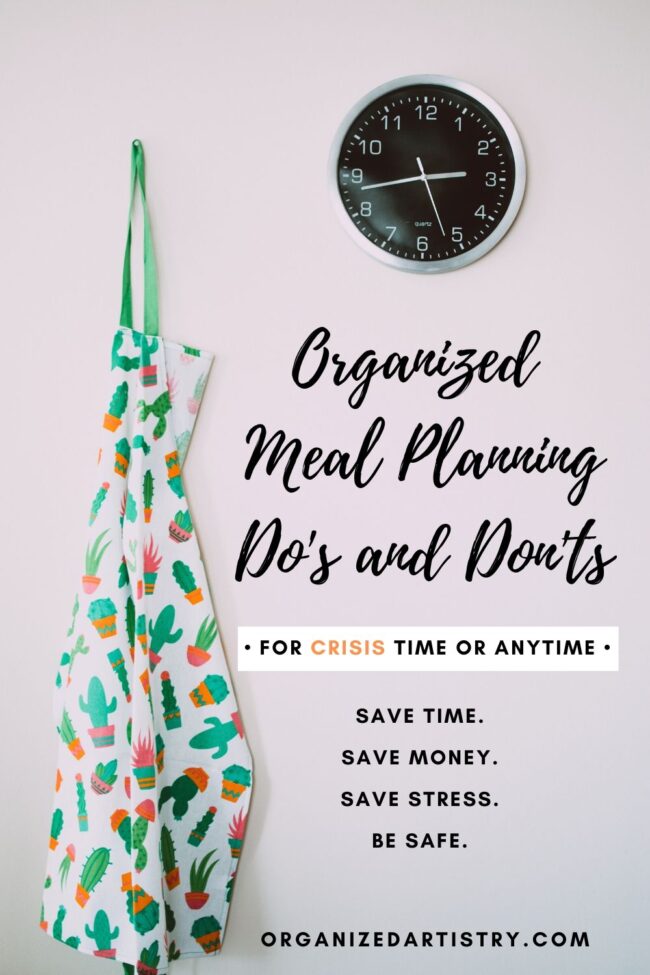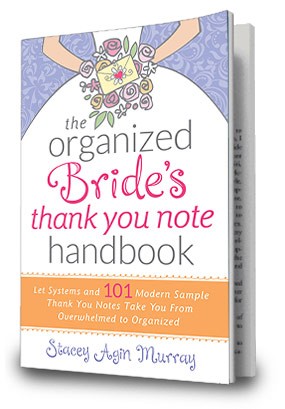This blog post is the second in a series of posts designed to teach you how to meal plan during times of crisis and in your everyday life (post-coronavirus). If there was ever a time to consider practicing the Art of Organized Meal Planning–it’s now.
With most of the country required to adhere to ‘stay at home’ orders, it’s just not practical or safe to be running out to the grocery store on a whim for today’s lunch or dinner. It’s time to start planning out the meals you prepare for yourself and your family. In my last blog post, I discussed the benefits to meal planning and shared my seven step system for meal planning success.
Ask anyone who has been meal planning for awhile whether they think it’s worth doing and I’m sure a majority would agree with a resounding, ‘YES!’ Meal planning saves you time, money, energy, and stress. It automates the process of what you and your family will eat every day. Three times a day. Not including snacks. That’s a lot of thinking about food that your brain doesn’t need to do on a daily basis! Meal planning prepares you with fuel for your body and brain and in unpredictable times such as these, meal planning will keep you safe.
To assist in keeping your tummies full, your brain less stressed, and your health in check, I’ve gathered some meal planning do’s and don’ts to help you reach your meal planning goals:
Organized Meal Planning Do’s and Don’ts
General Organized Meal Planning Do’s and Don’ts
Do pick a day of the week to do your meal planning. Many people choose a Saturday or Sunday but it doesn’t matter what day you set aside for meal planning as long as your meal planning gets done.
Don’t worry about meal planning on the same day every week. Just make sure you meal plan before leaving for the grocery store.
Do start small, start easy, and start where you are. No one learns to meal plan for a week at a time overnight. It takes practice, know-how, and desire.
Don’t become overwhelmed with meal planning. If you’re new to the concept, start by meal planning for one day. When you become more comfortable with meal planning, try doing it two days a week. Baby steps eventually reap big rewards.
Do your meal planning when your energy levels are at their highest. You need a good amount of brain power to meal plan successfully.
Don’t meal plan when you’re tired, frustrated, or hungry!
Do inventory your pantry closet and cabinets before buying more food and household goods.
Don’t forget to check your fridge for any foods about to turn green. ‘Almost-green’ food items can be turned into a meal with a bit of creativity.
Organized Meal Planning During Crisis Time or Anytime Do’s and Don’ts
Do block out at least one hour for the task. In the first post in this series, I discuss the process for meal planning. It takes time to check your pantry, look at recipes, and make your list–I promise you it will be time well spent.
Don’t rush through the meal planning process. Meal planning will save you time, money, stress, and energy. Giving meal planning the time it requires for success will make your life easier when you go to prepare meals and feed your family ALL DAY LONG. EVERYDAY. For the UNFORSEEN FUTURE…
Do choose recipes/meals that members of your family enjoy eating. This is a stressful time already. Planning and preparing what I call ‘crowd-pleaser’ meals keeps family members happy and willing to eat leftovers!
Don’t deprive yourself of certain indulgences if they are in your budget. Our bodies crave certain foods–even more so in times of crisis. If a more expensive cut of meat or a cake from your favorite bakery will make you or a family member happy, then plan for it.
Do check your store circular for sale items to build a meal around. Meal planning from the sale circular is a tried-and-true money-saver!
Don’t cook many meals that require expensive or ‘for-one-recipe’ ingredients. Save these recipes and ingredients for a time when the economy is more stable. You’re going to want to celebrate when this is all over, anyway!
Do plan out at least 3-5 days of meals with a week’s worth being optimal.
Don’t run to the supermarket every day. At the time of writing this, we are still being advised to leave the house for essential items as infrequently as possible. For this reason alone, it is imperative to jump on the meal planning bandwagon and make it a part of your weekly routine.
Do check your calendar before planning your meals for the next few days. Maybe you have a late afternoon Zoom meeting on Thursday or an early evening birthday drive-by on Sunday? You’re going to want to plan for quick-cook or easy-to-serve meals for those days.
Don’t think your calendar is just for jotting down events and reminders! Write the meals you’re cooking in your calendar to keep track of what you’ve cooked and when. You’ll know exactly which Tuesday you made tacos and which Sunday you chose to indulge in take-out. No need to strain your brain thinking about what meals you’ve prepared in the past–it’s all in your calendar.
Organized Meal Prep and Cooking Do’s and Don’ts
Do review your recipes before heading to the store. Write all ingredients on your shopping list to ensure you’ll have what you need when you start cooking.
Don’t think you can keep it all in your head. Recipes, ingredients, family favorites–take that information out of your head and write it on paper or in your phone/tablet. Use your pantry or cabinets as storage space–not your brain!
Do consider doubling your recipe or making a bit extra while you’re cooking (if you can). This will save you time in the future when you’re looking for a quick lunch or an easy-to-reheat meal for the family.
Don’t let leftovers go to waste! Not eating leftovers is a waste of money as well as the time it took you to cook it. Organize your leftovers on one side of your fridge or at eye level so you don’t forget about them.
Do plan to cook with fresh vegetables within the first few days of bringing the home from the supermarket. Unless they are a hearty vegetable like squash, carrots, or onions, there’s the possibility that your veggies will wilt or become mushy if not used quickly.
Don’t forget that frozen vegetables have similar amounts of nutrients as fresh. They are often harvested when they’re at their freshest. So, go ahead and buy some for your freezer. They’ll be there when you need them.
Meal planning may seem challenging and time-consuming but like any other task, the more you do it, the easier it gets. Remember to start small, start easy, and start where you are. Your meal planning efforts will become effortless in no time.
Which set of Do’s and Don’ts do you think you’ll find most helpful? Leave a comment–I’d love to hear from you!














 Contact Stacey to Get Started!
Contact Stacey to Get Started!






Oh, meal planning! I love to meal plan however I’ve been very unmotivated to do plan during the past 3 months. I love the dos and don’ts and will apply them to start meal planning again. So glad I can across this post.
Karen–I understand your lack of motivation to meal plan. Take it one meal at a time and one day at a time. Start with a meal that you enjoy that’s easy-to-make with minimal ingredients. Do it for the health of both your body and brain! Keep me posted!
I’m laughing about your “Don’t think you can keep it all in your head.” I’ve been learning that afresh during this time, thinking I’ll remember what I want to buy when I’m at the grocery store. Of course, I don’t, and since I’m trying to go less frequently, the consequences are more significant than ever! I have learned that I must go write the item on my shopping list THE MINUTE I think of it!
I keep a shopping list pad on my counter with a pen next to it at all times. As soon as I realize that I’m down to one more jar or one last apple, I write it on my pad. I could blink and forget in an instant (especially lately) so even if the toaster oven is buzzing or I’m in the middle of a task, I run to that pad to write down what I’ll need to buy on my next shopping trip. I have found it to be very helpful now and for all the years I’ve doing it (especially when my kids were little and my brain was foggy!).
I love this! I have friends who are really interested in starting to plan their meals. I’m going to pass this along.
Thanks for sharing my ideas with your friends, Jamie! I greatly appreciate it. Your friends will marvel at how much time, money, and energy they save by meal planning. I hope their meal planning journey brings them good health, less stress, and full bellies!
I love all your meal planning tips. I am a big fan and did it for years. I planned and my husband shopped. We saved so much money! It was great knowing what was for dinner!
I love how you split the meal planning tasks between you and your husband–good teamwork! And yes, meal planners are money savers! It’s mind-blowing how much money is spent on last-minute and on-the-run meals. And meal planning takes the stress out of having to answer the famous question I get every night, “What’s for dinner, Mom?”
I think I mentioned this before to you, but I’m not much of a meal planner. I use a more open-ended type of plan that involves having lots of ingredients on hand (fresh fruits, vegetables, proteins), doing some advanced cooking of certain things (like sweet potatoes or roasted cauliflower,) and then assembling a meal.
There are times when I experiment with a new recipe that will involve planning. Or, when we host a large event like Thanksgiving, Passover, BBQs, or other big gatherings, I definitely plan. But I’ve always been looser with this aspect of my life.
When the girls were little, they used to ask me, “Mom. What’s for dinner?” And my response was, “I don’t know, I’m not in the kitchen yet.” No one starved. They managed to grow up with regular meals. The funny part is that both of our daughters are much better cooks than I ever was. And they are meal planners. They didn’t learn it from me. 🙂
I love the response you gave your daughters before dinner time! And how wonderful that they’ve become meal planners. Sounds as if your ‘open-ended’ type of plan works well for you. When you know what kinds of protein, carbs, fruits and veggies are enjoyed by your family, it’s easy to mix and match at meal time for good health and enjoyment.
Love your advice about veggies. Totally agree. Use the fresh ones first and keep some good options in the freezer. My meal planning night is Sunday night when my boys are busy with youth group. The house is quiet and I can inventory the fridge, freezer and pantry. And batch cook or bake a few healthy snacks like banana muffins or zucchini bread. Great list of dos and don’ts
You’re wise to do your meal planning when the kids are occupied–fewer interruptions! I’m sure they’re thrilled when you batch cook and they come home to some yummy and nutritious snacks. Everyone benefits from meal planning!